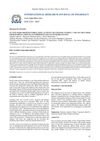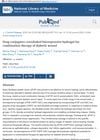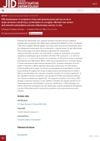7 citations,
January 1991 in “Comparative biochemistry and physiology. A. Comparative physiology” A diet high in vitamin E improved blood health, skin, and fur in common marmosets.
6 citations,
September 2023 in “International journal of molecular sciences” Oxidative stress worsens PCOS by damaging cells and disrupting metabolism, suggesting antioxidant treatments might help.
 6 citations,
December 2022 in “Cell reports”
6 citations,
December 2022 in “Cell reports” Eating a high-fat fish oil diet caused mice to lose hair due to a specific immune cell activity in the skin linked to a protein called E-FABP.
6 citations,
February 2021 in “Proteins” Researchers found that the most reachable bonds in wool fibers are near the ends of certain proteins, which help stabilize the fiber's structure.
 6 citations,
October 2013 in “Plastic and Reconstructive Surgery – Global Open”
6 citations,
October 2013 in “Plastic and Reconstructive Surgery – Global Open” HSL treatment speeds up hair growth and reduces oxidative stress in hair follicles of ob/ob mice.
 5 citations,
September 2022 in “Antioxidants”
5 citations,
September 2022 in “Antioxidants” A substance from Caulerpa racemosa seaweed may protect against skin damage caused by air pollution by reducing oxidative stress and cell death.
 5 citations,
April 2022 in “Journal of Chromatography B”
5 citations,
April 2022 in “Journal of Chromatography B” The new method can measure sleep-related hormones in hair effectively and could help track long-term sleep patterns.
5 citations,
September 2018 in “International journal of genomics” Genetic mutations that disrupt homocysteine breakdown lead to increased damage in mouse hair keratin.
 5 citations,
November 2017 in “Asian journal of pharmaceutical and clinical research”
5 citations,
November 2017 in “Asian journal of pharmaceutical and clinical research” Pakis Gajah (Angiopteris evecta) water extract may promote hair growth in rabbits, but more research is needed for human use.
4 citations,
May 2023 in “Pigment Cell & Melanoma Research” BMI1 is essential for preventing hair greying and maintaining hair color.
4 citations,
October 2017 in “Indian drugs” Hibiscus rosa-sinensis L. leaves and flowers contain various compounds with potential medicinal uses.
 3 citations,
March 2022 in “Polymers”
3 citations,
March 2022 in “Polymers” Substances from Ascidian tunics might help treat hair loss as effectively as Minoxidil.
 3 citations,
July 2020 in “Synthetic and Systems Biotechnology”
3 citations,
July 2020 in “Synthetic and Systems Biotechnology” Scientists improved an enzyme to better produce a hair growth-promoting chemical from an immunosuppressant.
 3 citations,
July 2019 in “Experimental Dermatology”
3 citations,
July 2019 in “Experimental Dermatology” Hair loss patients may have different polyamine levels in various scalp areas.
 3 citations,
February 2018 in “Clinical Medical Reviews and Case Reports”
3 citations,
February 2018 in “Clinical Medical Reviews and Case Reports” Hair transplants are usually safe but can rarely cause scalp AVF, which can be effectively treated with surgery or endovascular methods.
 2 citations,
August 2023 in “Development”
2 citations,
August 2023 in “Development” Hair follicles in the back of the rosette fancy mouse have reversed orientations due to a gene mutation.
 2 citations,
January 2023 in “Journal of Education, Health and Sport”
2 citations,
January 2023 in “Journal of Education, Health and Sport” Cognitive-behavioral therapy with habit reversal training is the most effective treatment for trichotillomania.
2 citations,
February 2021 in “IOP Conference Series Earth and Environmental Science” Mangkokan leaf contains various beneficial compounds like alkaloids, flavonoids, and steroids.
 2 citations,
December 2017 in “Bangladesh Journal of Pharmacology”
2 citations,
December 2017 in “Bangladesh Journal of Pharmacology” Black seed oil significantly protects against hair loss from chemotherapy.
 2 citations,
November 2015 in “Actas Dermo-Sifiliográficas”
2 citations,
November 2015 in “Actas Dermo-Sifiliográficas” The document suggests a possible link between mast cells and scarring alopecia, recommending more research for potential treatments.
 2 citations,
January 2012 in “Journal of metabolic syndrome”
2 citations,
January 2012 in “Journal of metabolic syndrome” The document concludes that hirsutism can be managed with various treatments tailored to the individual, potentially improving quality of life.
 2 citations,
January 1997 in “Principles of Medical Biology”
2 citations,
January 1997 in “Principles of Medical Biology” Drug metabolism affects how long a drug works, its interactions, activation, and toxicity, and is influenced by genetics, diet, illness, and other drugs.
 1 citations,
October 2018 in “International research journal of pharmacy”
1 citations,
October 2018 in “International research journal of pharmacy” Rampai leaves extract can significantly stimulate hair growth.
1 citations,
May 2003 in “The journal of investigative dermatology/Journal of investigative dermatology” A hormone affects hair growth, certain molecules may prevent skin damage, a skin disease is linked to immune cells, glycerol helps skin hydration, and psoriasis treatment trials need improvement.
 December 2024 in “Plant Science Today”
December 2024 in “Plant Science Today” Phyla nodiflora contains compounds that may help treat diabetes, alopecia, cancer, and anti-diuresis.

The hydrogel significantly improves healing in diabetic wounds.
 May 2024 in “Actas dermo-sifiliográficas/Actas dermo-sifiliográficas”
May 2024 in “Actas dermo-sifiliográficas/Actas dermo-sifiliográficas” Effective treatments for trichotillomania include cognitive-behavioral therapy, certain medications, and alternative support tools.
November 2023 in “Plants” Compounds from Jatropha cordata bark have significant anti-inflammatory effects and could help with hair loss.
 September 2023 in “Translational medicine reports”
September 2023 in “Translational medicine reports” Minoxidil ingestion can raise liver enzyme levels.
 April 2023 in “Journal of Investigative Dermatology”
April 2023 in “Journal of Investigative Dermatology” An oil-in-water emulsion with CBD and ginger root extract significantly improved symptoms of dry and eczema-prone skin.




















